Picture
Your Present Location: HOME> PictureUS-China University Presidents and Think Tank Forum held in New York City
As one of the most important events of the “Sino-US social and people-to-people dialogue” mechanism, "US-China University Presidents and Think Tank Forum" was held at Columbia University in the City of New York on September 26, 2017. The forum was hosted by Renmin University of China (RUC) and University of Columbia, co-organized by Chongyang Institute for Financial Studies at RUC (RDCY) and Asia Society Policy Institute. Chinese Vice Premier Liu Yandong made a keynote speech at the forum.
It was attended by more than 200 people including presidents from about 40 universities of US and China, and representatives from think tanks and business circles, such as Chen Baosheng, Minister of Education of China, Li Bin, Director of the National Health and Family Planning Commission, Cui Tiankai, Chinese Ambassador to the US, Jiang Xiaojuan, Deputy Secretary-General of State Council of China, Zheng Zeguang, Vice Minister of Foreign Affairs, Tian Xuejun, Vice Minister of Education, Yu Weiping, Vice Minister of Finance, Zhang Qiyue, Chinese Consulate-General in New York, as well as Henry A. Kissinger, Former US Secretary of State, Robert Zimmer, President of the University of Chicago, Peter Salovey, President of Yale University, and John Jenkins, President of the University of Notre Dame.
On the theme of “China-US Relations in the Next 50 Years”, the forum kicks off with the melodious music performed by the students from The Juilliard School and Tianjin Conservatory of Music. At the opening ceremony, Lee C. Bollinger, President of Columbia University, and Jin Nuo, Chairwoman of the University Council of RUC, made welcoming remarks as the representatives of the hosts respectively. Josette Sheeran, President and CEO of the Asia Society, Stephen A. Schwarzman, Chairman, CEO and Co-Founder of The Blackstone Group, and Henry A. Kissinger, Former US Secretary of State and Chairman of Kissinger Associates Inc, made keynote speeches representing the US side, and then Chinese Vice Premier Liu Yandong delivered an important keynote speech, and responded to the questions from the teachers, students and experts at the forum.
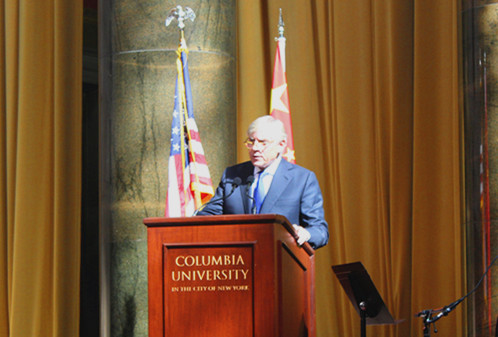
During his welcoming remarks, Lee C. Bollinger said that the university is the cradle of innovation and talents nurturing, and has made great contributions on promoting people-to-people exchanges between China and the United States. As early as 1908, there were Chinese students graduating from Columbia University, and these students became the important participants and leaders in the process of China’s rise. He hoped that the presidents from the Universities and the representatives from think tanks and business community share their understanding and thinking about Sino-US relations in the next 50 years.
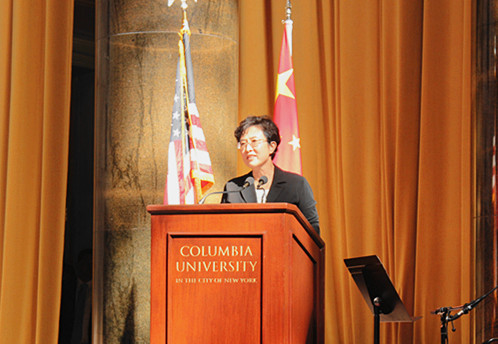
Jin Nuo stressed that people-to-people exchanges helped to deepen Sino-US relations. Against the backdrop of globalization and internationalization of higher education, strengthening international exchanges and cooperation has become the consensus of universities and think tanks. In recent years, Renmin University focused on cultivating the National Academy of Development and Strategy, RDCY and a number of new type of think tanks with Chinese characteristics, forming its own think tanks development system. Sino-US think tanks dialogue, as an integral part of the Sino-US people-to-people exchanges, will play an important role for the stable development of bilateral relations, She noted.
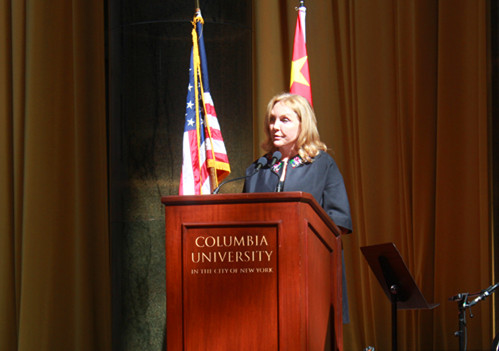
Josette Sheeran spoke highly of the "Belt and Road Initiative" at the opening ceremony. She pointed out that China has become a global contributor, not only the contributions on the peacekeeping and humanitarian work in the United Nations, but also the initiative of Belt and Road, which seeks to connect the Silk Road Economic Belt, Maritime Silk Road, China-Pakistan Economic Corridor and so on, is expected to affect the lives of nearly two-thirds of the world`s population.
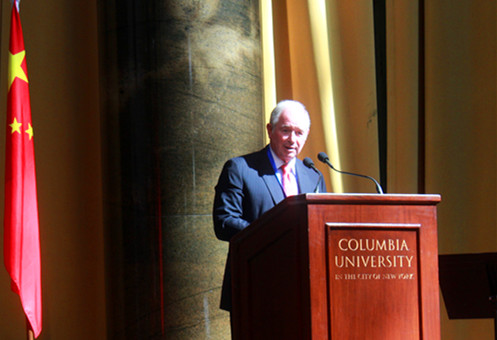
Stephen A. Schwarzman said that the university is an important platform for cultural exchanges between China and the United States. It is necessary to promote the understanding of the young people and deepen the friendship between the youths, which will lay a solid foundation for the people-to-people exchanges of two countries. He hope that such kind of exchange projects flourish in the future.
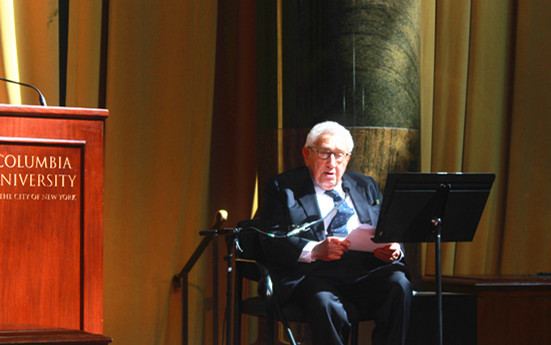
Henry Kissinger said that the US-China relationship will be the defining relationship for the world of the 21st century, and the two countries should work together to promote peace and human progress. He said that he has visited China more than 100 times since the first one 46 years ago, learning something on each trip, noting that the culture of China is so manifold that he will never cease learning.
He said that China`s Belt and Road Initiative, in seeking to connect China to Central Asia and eventually to Europe, will have the practical significance of shifting the world center of gravity from the Atlantic to the Pacific.
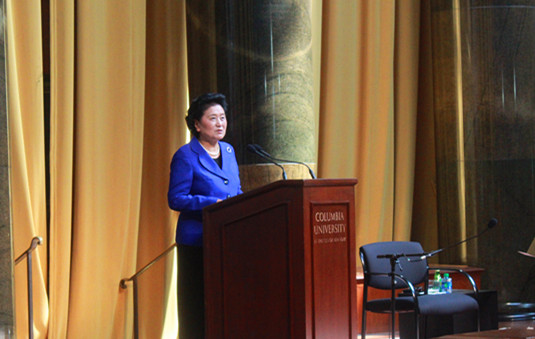
Liu Yandong said that only by constantly releasing the positive energy of the people-to-people and cultural exchange between China and the US, enhancing the understanding and friendship between the two peoples and consolidating the friendly public opinion foundation of the two countries, can Sino-US relations maintain a long-term, healthy and stable development.
To establish exchanges as the foundation of bilateral relations, Liu believes China and the US should take to the grassroots. She suggested that the two governments provide more conveniences to people of the two countries in tourism, overseas study and exchange visits and create conditions to encourage young people to communicate more.
Liu said that because the university is the cradle of talent and think tanks the incubators of thought, they not only affect the views of the government and the public on Sino-US relations, but also affect the awareness of next generation on Sino-US relations.
In the afternoon, dozens of experts and scholars attended the discussion on the following four topics: “U.S.-China Relationship Review: From Economic, Political and Cultural Perspective”, “The Next 50 Years: Proposals in Tailoring Mutual Trust and Benefits”, “Exploring Suggestions in Deepening U.S.-China People-to-People Exchange”, and “Belt and Road: From American and Chinese Understanding”.
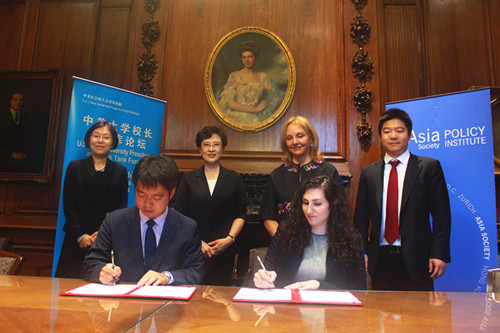
During the forum, Wang Wen, Executive Dean of RDCY and Debra Eisenman, Executive Director of Asia Society Policy Institute, on behalf of the two institutes, signed the Memorandum of Understanding on Joint Research to Advance U.S.-China Cooperation on "Belt and Road Initiative".
.
Key Words: China; US; RDCY; think tank























































































 京公网安备 11010802037854号
京公网安备 11010802037854号





